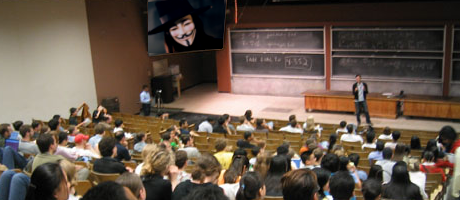Continuing Wikileaks fallout: What the students think

The Wikileaks saga keeps on ticking over and there is no let-up in sight for a good few weeks yet. I think only a general election or a terrorist attack could kick this story off the front pages of the papers. That is, of course, if you do not consider this to be a 'terrorist attack' in itself.
While Julian Assange is in Wandsworth Prison counting down the days to his extradition to Sweden, Wikileaks continues to publish more of the still-classified communiques sent between diplomats over seemingly secure networks.

Some of the recent, pressing details that have come out of the leaks in the last twenty-four hours include a 'crazy but charming' Robert Mugabe, the publication of hundreds of highly critical points of respective national infrastructure, and a continuation of denial-of-service attacks against major online organisations which pulled their plug of support on the leaking network.
Chris Dawson, resident Education blogger, gives us a great insight into how to deal with school students who inquire, and consider the ethics and morals behind the vast scale of classified releases.
But what do students tell us about the Wikileaks release? There are three strands which are widely available to be taken as 'the opinion of the student' thus far:
Opinion 1: Wikileaks holds governments truly accountable. The public should know everything.
This selection of students on the most part are the socialist, center-to-left view holding set of students with views that governments should not hold secrets, release all information, or have a third-party group such as Wikileaks 'holding governments to account' by releasing classified information regardless of the consequences.This at a time when students are in a hotbed of political activity, especially on this side of the pond with the raising of tuition fees playing a prominent role in today's politics, and angry students clutching at straws in any political imbalance to embarrass the government at hand.
Twitter is, at the moment, a main source of the venting of anger for many students campaigning for free speech and open governments. The US State Department though has warned over sharing these still-classified files.
Opinion 2: Wikileaks is demonstrating the next-generation of 'terrorism'
In opposition to the Wikileaks release taking the other end of the polar spectrum, the more center-to-right students are taking the approach that Wikileaks is essentially either a terrorist group, or in some way terrorism-related due to the impact they are having around the world. Also, with some of the released leaks, they argue that they can be used to aid and abet terrorists and criminals, thus making Wikileaks no better than those who finance acts of terrorism.As I've argued before, the web and social media can be used as a conduit to acts of terrorism on the front of Wikileaks, but also a defence campaign for good to protest over issues by enacting denial-of-service attacks.
Opinion 3: Wikileaks? No idea what that is, because we don't watch the news
Believe it or not, a huge minority of students and the Generation Y are relatively unaware of the Wikileaks story or consequences because they simply don't watch the news. After a couple of personal cases discussing the leaks with student colleagues, their brief opinion fell into either 1 or 2, but felt that, "it probably didn't affect them anyway".What's your opinion? Left, right or or blissfully unaware?